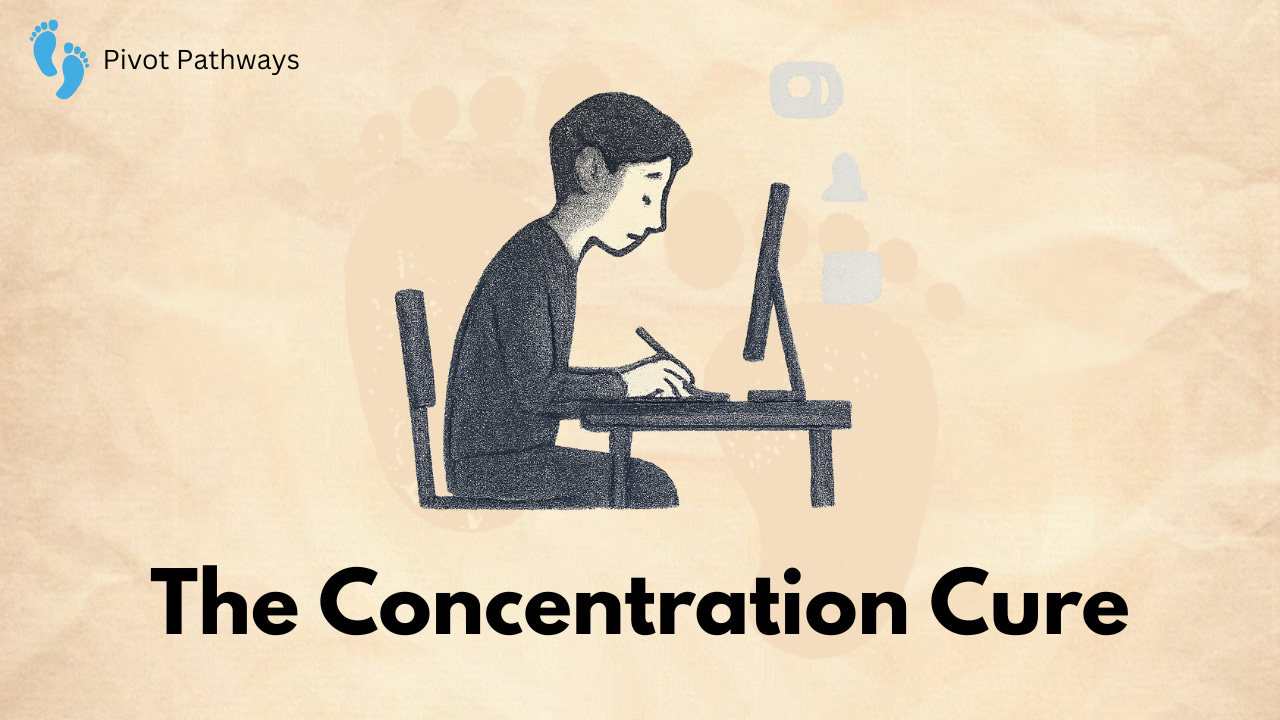In our hyperconnected world, the ability to concentrate has become a superpower. While self-improvement content floods every corner of the internet, most people already know exactly what they need to do to improve their lives. The real challenge isn't knowledge—it's execution. We know we should write that essay, fix that strange car noise, or tackle that important project, yet we consistently choose distraction over action. This phenomenon isn't just personal weakness; it's the predictable result of living in an attention economy designed to fragment our focus.
The mathematics of distraction are staggering. Companies invest billions annually in sophisticated marketing systems engineered to capture and monetize our attention. Every notification, popup, and algorithmic recommendation represents a calculated assault on our cognitive resources. We're not just competing with our own procrastination anymore—we're battling industrial-strength attention harvesting systems that have turned distraction into a science.
This reality creates an unprecedented opportunity. In a world where most people struggle to focus for even thirty minutes, the ability to concentrate deeply becomes your competitive advantage. You don't need eight hours of monk-like discipline to transform your life. One hour of ruthless, active concentration on your most important task will generate more meaningful progress than an entire week of scattered effort.
The foundation of sustained focus begins with your physical environment. Your surroundings either support or sabotage your intentions. Each room should serve a specific purpose, with every object either contributing to that purpose or being removed entirely. That wireless phone charger on your desk might seem convenient, but it's actually an invitation for interruption. Moving it just out of sight eliminates the constant temptation to check notifications. Your bedroom is for sleeping, not scrolling. Your office is for working, not entertaining. When you align your physical space with your intended behavior, you remove friction from productive actions while adding friction to destructive ones.
Your digital environment requires equally deliberate design. The platforms you use daily are optimized for engagement, not for your wellbeing or productivity. Strategic interventions can reclaim your digital autonomy. Browser extensions that eliminate Facebook's news feed replace endless scrolling with motivational quotes. Distraction-free YouTube removes the homepage thumbnails and sidebar recommendations that lead to hours of unintended viewing. These small modifications transform potentially destructive platforms into tools that serve your purposes rather than corporate algorithms.
The most radical step involves removing social media apps from your phone entirely. When accessing Instagram or Twitter requires typing the URL into a browser, you create a moment of friction that allows conscious choice to override automatic behavior. This isn't about digital minimalism as an ideology—it's about intentional technology use that serves your goals rather than undermining them.
The deeper transformation happens in your mind. Developing a philosophy of intentionality means becoming ruthlessly present with whatever you're doing. This isn't hustle culture demanding every moment be productive. Playing video games for two hours after completing focused work is entirely different from gaming to avoid important tasks. The key is full engagement without guilt or divided attention.
Creating a daily schedule isn't about rigid control—it's about conscious design. Before building your schedule, ask yourself what would make you feel genuinely fulfilled. How much time should you dedicate to work, relationships, recreation, and personal growth? Once you've designed your ideal day, execute it with complete intentionality. When you're working, you're fully present with work. When you're playing, you're fully present with play. This presence transforms both productivity and leisure.
Start with one hour of focused work on your most important task. Most people can manage one hour once they commit to it. After twenty minutes, you'll often find yourself entering a flow state where concentration becomes effortless. After mastering one hour, gradually increase to ninety minutes, then two hours. Three hours of intense focus typically produces more results than an entire week of distracted effort.
The compound effects are remarkable. As your concentration improves, you accomplish more in less time, creating space for activities that truly matter to you. High-intensity focus sessions reduce the total time needed for any task, whether it's work, exercise, or creative projects. You begin living intentionally rather than reactively, making choices based on your values rather than impulses.
The ability to concentrate isn't just a productivity hack—it's a fundamental life skill that determines the quality of your existence. In an age of infinite distraction, those who master focus will create lives of genuine meaning while others remain trapped in cycles of scattered attention and unfulfilled potential.
If you found this post helpful, consider Buy me a coffee ☕. Your support means the world to me!
Ready to master the art of deep focus? Upgrade to our premium subscription for exclusive in-depth strategies, advanced concentration techniques, and early access to all our content. Get the tools you need to thrive in the attention economy.
Want personalized guidance on building your focus practice? Book a one-on-one consultation to develop a customized concentration system that works for your unique situation and goals.




